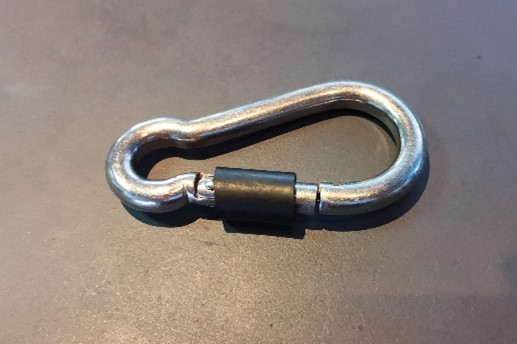LTI: person injured when hook parted during lifting operations
What happened
Two crew were stood under a 3m depth skid of a cable installation plough calibrating it when part of the rigging holding the plough parted causing it to fall on them, injuring them both.
The plough depth skid, weighing around 320kg, was lifted at one end by the vessel crane; a fixed pad eye at the end of the skid was attached by a hook, sling and chain block. Suddenly the hook parted, and the depth skid fell down, knocking over both crewmen. Both landed badly; one of them sprained his leg; the other suffered a fractured wrist. Both were sent ashore by guard boat for medical treatment. Subsequent medical check showed that one of them suffered fractures of the left wrist and radial head (below the elbow).


What went wrong?
- It was shown afterwards that because the pad eye on the plough depth skid was too small for a standard hook, the crew used an entirely inappropriate spring snap hook to link the skid and the sling;
- The two crew were in the wrong place – under the load, in the line of fire.

- Actions taken
- Further crew training on correct lifting loose gear application, emphasizing that unqualified loose gear should not be used for any lifting work;
- The pad eye was modified and tested so that a standard and properly qualified hook can be used;
- Hazard Identification and Risk Assessment form for plough operation was reviewed and revised:
- To include safe positioning of crew and,
- To enhance supervision by requiring the team leader to check safety positioning.
Members may wish to refer to:
Safety Event
Published: 13 September 2021
Download: IMCA SF 25/21
IMCA Safety Flashes
Submit a Report
IMCA Safety Flashes summarise key safety matters and incidents, allowing lessons to be more easily learnt for the benefit of all. The effectiveness of the IMCA Safety Flash system depends on Members sharing information and so avoiding repeat incidents. Please consider adding [email protected] to your internal distribution list for safety alerts or manually submitting information on incidents you consider may be relevant. All information is anonymised or sanitised, as appropriate.
IMCA’s store terms and conditions (https://www.imca-int.com/legal-notices/terms/) apply to all downloads from IMCA’s website, including this document.
IMCA makes every effort to ensure the accuracy and reliability of the data contained in the documents it publishes, but IMCA shall not be liable for any guidance and/or recommendation and/or statement herein contained. The information contained in this document does not fulfil or replace any individual’s or Member's legal, regulatory or other duties or obligations in respect of their operations. Individuals and Members remain solely responsible for the safe, lawful and proper conduct of their operations.
